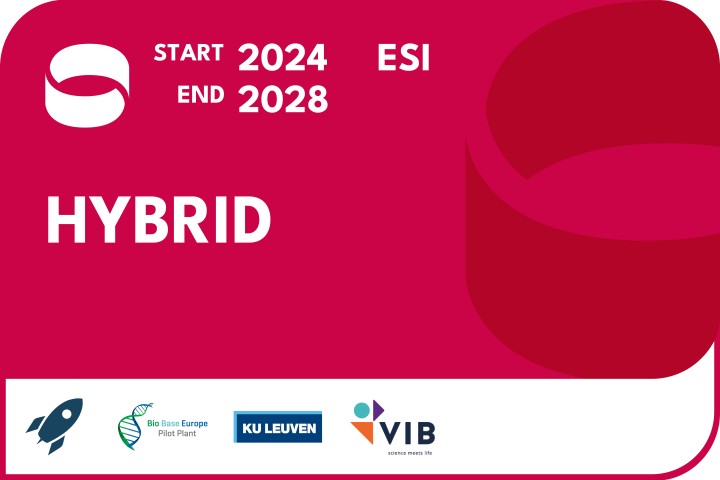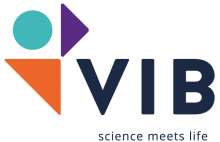HYBRID
Harnessing pYrolysis & Biotechnology to Recycle mIxed plastic waste to Dicarboxylic acids.

In HYBRID, we will design an innovative chemical/biological upcycling process, able to convert difficult-to-recycle mixed plastic waste (MPW) from packaging to high-value building blocks for polymers & their additives. A catalytic pyrolysis will convert MPW to tailor-made alkene/alkane mixtures with desired C lengths. An engineered yeast will funnel this heterogeneous mixture to specific dicarboxylic acids (DCAs). To maximize efficiency, an advanced biphasic fermentation process will be developed.
The world is facing a growing plastic waste crisis, with a huge imbalance between yearly plastic production and recycling. Of the 57 Mtons production in Europe in 2021, only 10% originate from recycled plastics. Moreover, >40% of the collected plastic waste is incinerated for energy recovery. While MPW represents an abundant (roughly 40% of total plastic waste) and largely untapped feedstock for upcycling, its chemical diversity and complexity limit its current value. This is mainly because no satisfying solution exists for the closed loop of mixed polyolefin (PO) streams containing low density polyethylene (LDPE) foils and residual fractions which contain additives, multiple polymers and/or impurities. Yet, when combined with a matching downstream biological process, this purification hurdle can be solved as all components can be funnelled by engineered microbes into a single product class.
In HYBRID, we will develop a hybrid process consisting of pyrolysis, biological funnelling, fermentation technology and innovative product recovery and purification with maximal resource recycling, for converting MPW with more than 70% polyolefins (PO) in high-value building blocks for nylon-type and polyester polymers & polymer additives. Chemical recycling has emerged as an effective way to tackle previously unrecyclable waste. However, many chemical recycling approaches focus on selective depolymerization of single plastic streams and struggle with heterogeneity in monomer and bond types, or with the presence of heteroatoms and impurities. Microbiology has high potential to complement chemical recycling. Biorefinery pipelines consisting of an chemical treatment, followed by biological funnelling to high-value compounds have gained increasing interest but these are mainly restricted to the conversion of sugars from lignocellulose to biofuels and lignin to aromatics. However, microorganisms have an incredible capacity to catabolize a wide array of substrates. In HYBRID, we will uniquely combine rational cracking of MPW with bioconversion of a heterogeneous stream to DCAs using a Yarrowia lipolytica platform. While bioconversion of sugars/polyols to DCAs has been studied, the use of alkane/alkene mixtures is underexplored. We will focus on production of adipic acid (AA), a DCA with the highest industrial relevance but produced using fossil fuels.
In a first research line we will focus on the pretreatment and catalytic pyrolysis of MPW to liquid olefins. There will be a special focus on the impact of the impurities on the formed products, and whether further pretreatment will be required. Various product compositions are possible, however, catalytic cracking of PO generally leads to gaseous and liquid fractions, composed of paraffins, iso-paraffins, olefins, naphthenes & aromatics. The aim is to maximize the liquid outcome of the reaction containing alkanes/alkenes with a desired C length distribution between C6-C14. The gaseous phase of molecules < 5C can be used as fuel for energy during the process steps.
In the second research line, subsequent biological funnelling of the pyrolyzed fraction into building blocks for polymers is tackled. This includes the development of a novel biological process (using the yeast Y. lipolytica) to convert liquid olefins into polymer building blocks. To increase versatility of the pipeline and to de-risk the most critical elements, various parallel strain engineering pipelines will be explored. We will screen an in-house strain collection to select the most suitable chassis strain and construct multiple yeast variants using state-of-the-art synthetic biology to increase flexibility of the process and input material. In addition to strain development, advanced fermentation strategies and intensified product recovery techniques will be combined. These include the development of a biphasic fermentation process alleviating substrate and/or product toxicity and the integration of in situ product recovery (ISPR) while targeting maximal resource recycling. As such reactive extractants can be applied to boost product titers and productivity, yet require careful composition of the extractive solvent mixture to balance extraction and biocompatibility. In addition, efficient back extraction techniques will allow to obtain purified AA with maximal resource recycling.
